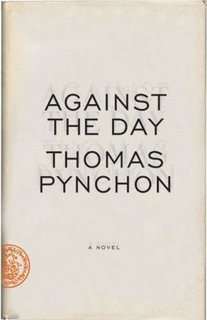
Thomas Pynchon, Against The Day
I started this book on Tuesday, November 21st (the day it was released) and just finished it today. Whew!
Years ago I received a copy of Gravity's Rainbow as a Christmas gift, and I've been hooked on Pynchon's works ever since! By turns profound and hilarious, goofy and infuriating, beautifully eloquent and downright nauseating, his novels depict a world rooted in historical facts that are judiciously seasoned with hippie-era paranoia, jazz-inflected song lyrics, fetishisms, talking animals, quirky dialogue, and more pop culture references than a Chuck Klosterman essay. And despite publishing only six novels over a forty year writing career, the elusive Grandfather of Postmodernism has given us what may potentially be his final novel -- and it's a whopper!
Against the Day has an elaborate, rambling plot that goes something like this: Webb Traverse is a Colorado miner who moonlights as the Kieselguhr Kid, a dynamiting anarchist. When robber-baron capitalist Scarsdale Vibe puts a hit out on Webb, the Traverse kids -- sons Reef, Frank, Kit, and daughter Lake -- set out on their own narrative trajectories in part to avenge Webb's death. Along the way, each of Webb's kids gets involved in separate adventures that weave in and out of each other's lives as well as history itself, including the 1893 Columbian Exposition in Chicago, the Tunguska Event of 1908 in Siberia, the Mexican Revolution, World War I, and the early years of the motion picture industry in Hollywood, among others. We also get Skip the ball lightning, Thorvold the tornado, a young Groucho Marx, a Viennese operetta entitled The Burgher King, the walking dead, Chinese things, tarot cards, and lots of mayonnaise ... and peering down upon the action at all times are the wonderful Chums of Chance, a quintet of ballooning aeronauts who drift throughout the narrative with their lovable Henry James-reading skydog, Pugnax.
What I found most fulfilling here is the way in which Pynchon manages to link this novel with his previous five novels, tying together underground postal systems with the beginnings of modern weaponry with speculation about civilizations below the earth's surface with simple father-daughter and parent-child relationships, never once losing typical Pynchon themes and motifs like corporate greed, political conspiracy, labor issues, and harmonica marching bands (trust me on this). Had I not read his earlier novels, this work might seem like a rambling mass of 1,085 pages of jibberish; having read the other books, this is an elaborate "singl[ing] up all lines" of the massive ongoing novel that is "the works of Thomas Pynchon."
Which is not to suggest, however, that only veterans of Pynchon's works will enjoy Against The Day. Au contraire, this novel is much more accessible than his ever-daunting 1973 masterpiece, yet more enjoyably complex than, say, The Crying of Lot 49 or Vineland. If ever a reader wanted to experience the wacky world of Pynchon and follow the story to boot, s/he might reasonably opt for Lot 49 or Vineland before attempting the Rainbow -- or, dare I suggest it, cut his teeth on Against The Day.
Let the reader decide. Let the reader beware. ; )
No comments:
Post a Comment